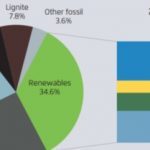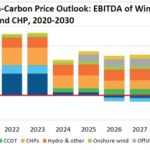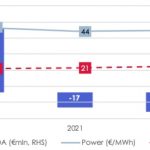The upward trend in the carbon price since 2015 has already seen coal generation decline significantly. Last year, total generation was a little over 100 TWh; it was 263 TWh in 2003. Sebastian Ligewie at Energy Brainpool looks at the prices of hard coal, lignite and the EUAs (EU emission allowances). It’s around €37 per MWh for hard coal and €8 for lignite. But emissions costs of around €63 per MWh for hard coal and €84 for lignite are added to … [Read more...]
Power to the people: citizen-centred Just Transitions challenge energy system centralisation
EU Member States need to phase-out coal and transform their carbon-intensive industries to make Europe climate-neutral. However, these should not be the only goals: transparency and justice must also accompany this path, argue Diana Süsser at IEECP, Serafeim Michas at TEESlab and Ricardo Antonio García Mira at the University of A Coruna. As Member States implement their territorial just transition plans, they must ensure they benefit affected … [Read more...]
Germany closes its last 3 nuclear reactors. Understanding the reasons why
Germany has a long history of being resistant to all things nuclear. No new commercial reactors have been built since 1989. By 2023, nuclear made up only 6% of its power mix. To meet its decarbonisation goals, the government is confident of its target to reach an 80% renewables share in electricity demand by 2030 without nuclear. Hence the shut-down of its last three reactors over the weekend. Yet nuclear supporters say that leaving the last six … [Read more...]
Germany: can 100% renewable power reduce energy costs within the decade?
A bold report is presented by Thure Traber, Hans-Josef Fell and Sophie Marquitan at Energy Watch Group. It says that a 100% renewable power system for Germany can undercut fossil power within this decade. The authors look at the full cost of fossil power, including subsidies. Importantly, they explain how unit costs will rise further, as demand declines, due to the decreasing utilisation of its expensive infrastructure. Meanwhile, total system … [Read more...]
Germany 2021: coal generation is rising, but the switch to gas should continue
As news across Europe shows, a combination of factors is seeing coal powered electricity generation on the increase. Simon Göss at cr.hub, writing for Energy Brainpool, takes a close look at what’s going on in Germany. The post-pandemic demand bounce-back, low generation from wind due to calm weather, and record high gas prices have made coal more competitive. That’s even with rising prices for CO2 and record high prices for coal (caused by … [Read more...]
Fit for 55: Does squeeze on gas make coal exit harder? Event summary + video
On May 18, 2021, Energy Post hosted an expert panel with the European Commission, E3G, CERRE and PKEE (the Polish Electricity Association, who also sponsored the discussion). It looked at some of the key EU support mechanisms offered to countries/companies transitioning away from coal, including the EU ETS' Modernisation Fund, the Just Transition Fund and also how State Aid Guidelines (EEAG) contribute. We asked Stefaan Vergote (Senior Advisor … [Read more...]
Does new German target mean Coal gone by 2029, Renewables 65% by 2030?
The stiffer emissions targets introduced this month to Germany’s Climate Protection Law - CO2 emissions from the energy industry must fall to 108 Mt by 2030 instead of 175 – point to an even earlier coal phase-out date of 2029, with renewables generating 65% of electricity by 2030. The existing plan had meant coal must be gone by 2038. Michael Claußner, Carlos Perez-Linkenheil and Simon Göss at Energy Brainpool explain why, using their modelling … [Read more...]
Coal exit: EU policy revisions must face both tech and socioeconomic obstacles
By 2030, the EU must cut its emissions by at least 55% compared to 1990 levels. Agreeing on the target was hard enough. Much harder will be agreeing on the design of the rules, regulations and financial support needed to achieve it. Pieter de Pous at E3G scopes out the major decline already experienced by coal - the worst emitting energy source - before looking at the challenges faced by heavy coal users in Central and Eastern Europe (CEE). The … [Read more...]
“The Role of the EU ETS in Decarbonisation to 2030” [written summary of the panel discussion]
Here you can read a summary of the online discussion from March 19th 2021 on the current debate over the review of the EU ETS. The full video is available here. Of primary concern for fossil-dependent lower income nations is the carbon price rising so high that it reduces available budget for investment in clean energy. If that happens there’s clearly a problem. The counter argument is that there are other funding mechanisms available, and more … [Read more...]
“The Role of the EU ETS in Decarbonisation to 2030” [Energy Post event video]
Here you can watch our video of the online discussion from March 19th 2021 on the current debate over the review of the EU ETS. Of primary concern for fossil-dependent lower income nations is the carbon price rising so high that it reduces available budget for investment in clean energy. If that happens there’s clearly a problem. The counter argument is that there are other funding mechanisms available, and more than one pathway for successful … [Read more...]
An EU ETS that lifts carbon prices too high can make clean energy transitions harder
This coming Friday 19th March, 11.00 to 12.30 CET, we have an online panel discussion plus audience Q&A on "The Role of the EU ETS in Decarbonisation to 2030". All are invited. We will dig into how the EU ETS is being shaped to ensure it meets its primary objective, the decarbonisation of Europe. To help set it up, Wanda Buk, Vice-President for Regulatory Affairs at PGE Group answers questions that are being asked of Poland’s position and its … [Read more...]
Coal Phase-Out in Central Europe: cooperation is better than law suits
On Monday (February 22nd 2021) the Czech government announced their intention to file a lawsuit in the EU Court of Justice against Poland’s plan to “expand the mining” at Turow, saying it can endanger the drinking water for up to 30,000 people living in the Liberec Region. Frank Umbach at EUCERS argues such a lawsuit sets a dangerous precedent that could stand in the way of regional cooperation and achieving the EU’s climate goals. Instead, the … [Read more...]
Poland’s PGE: profits from Renewables can replace declining Coal’s
Poland’s PGE is one of Europe’s most fossil fuel intensive energy firms. Coal makes up around 90% of its electricity generation. It’s been investing around PLN 28bn ($7.2bn, €7bn) to build three new coal power plant units, acquire the Polish coal assets of France’s EDF, and upgrade its existing fleet to meet air quality standards. But a new and detailed report from IEEFA warns that the profitability of these investments will decline in the 2020s … [Read more...]
IEEFA Germany: RWE’s coal phaseout compensation demands defy market prices
How much should the coal producers be compensated for Germany’s phaseout? RWE wants €1.2bn per GW at least, basing its maths on an EU-approved scheme from 2015. But Gerard Wynn, writing for IEEFA, says too much has changed since then, not least the Paris Agreement and the actual market price for coal assets. By his calculations, the true price should be under €100m per GW down to near zero. Vattenfall and Engie have already taken such a hit. … [Read more...]
Greece: lignite asset sale failure could shift focus to electricity market reform and renewables
This month Greece’s Public Power Corporation (PPC) admitted its effort to sell a third of its lignite assets had failed. Dr. Nikos Mantzaris, of the think tank The Green Tank, gives his explanation for why the numbers never added up for the buyers. He now fears the PPC will simply sweeten the deal. Instead, Greece should abandon failing lignite assets, reform the electricity market and refocus on renewables. … [Read more...]














